Please Share::  India Equity Research Reports, IPO and Stock News
India Equity Research Reports, IPO and Stock News
Visit http://indiaer.blogspot.com/ for complete details �� ��
Visit http://indiaer.blogspot.com/ for complete details �� ��
The top five recommended ELSS based on Fundsupermart.com's in-house research methodology.
As per Section 80C of Income Tax Act 1961, individuals are allowed to invest up to Rs 100,000 in tax saving instruments, which will be deductible from their gross total income. Investing in tax saving mutual funds or equity linked saving schemes (ELSS) offers not only tax benefits but also an opportunity to create wealth.
Equity linked saving schemes are equity-oriented mutual funds with a lock-in period of three years. Dividends received from ELSS funds are also tax exempt. The low lock-in period and the potential to generate market-linked returns make them a tax saving favourite.
We highlight our recommended tax saving funds.
Disclaimer: This article is for information purpose only. This article and information do not constitute a distribution, an endorsement, an investment advice, an offer to buy or sell or the solicitation of an offer to buy or sell any securities/schemes or any other financial products /investment products mentioned in this article or an attempt to influence the opinion or behavior of the investors /recipients.
Any use of the information /any investment and investment related decisions of the investors/recipients are at their sole discretion and risk. Any advice herein is made on a general basis and does not take into account the specific investment objectives of the specific person or group of persons. Opinions expressed herein are subject to change without notice.
1. Canara Robeco Equity Tax Saver Fund
Canara Robeco Equity Tax Saver Fund has a track record of more than a decade and half. It was launched in March 1993 and is managed by Soumendara Nath Lahiri. On a five-year basis as on 30 November 2011, this fund has shown the best performance in the ELSS category.
Fund Size: Rs 302.14 crore (as on 31/10/2011)
Benchmark: BSE 100
Fund's Statistical, Performance and Portfolio data are taken from ACE MF.
Investment strategy
The fund follows growth style of investing with a blended portfolio of large, mid and small cap stocks. The fund manager keenly plays on India's growth story. It holds stocks in the range of 50-57 with a bias to large cap stocks. The fund takes market capitalisation calls looking at the market conditions. But it generally limits the allocation to small cap stocks between 10 to 15 per cent. The previous fund manager, Anand Shah, had transformed the fund from a concentrated portfolio to a more diversified one in September 2008.
The Fund's top 10 stocks and top five sectors constitute 35.97 per cent and 47.71 per cent of the portfolio respectively.
Performance
The early years of the fund were not remarkable. It had mediocre performance till 2007. From 2008, the fund has given continuous outperformance against the ELSS category average and its benchmark. It has outperformed ELSS category's average and its benchmark on 6 months, 1-year, 3-year and 5-year periods as on 30 November 2011.
On a 5-year basis as on 30 November 2011, it has shown the best performance in the ELSS category.
Based on the our tests, the fund has ranked amongst the top 2 funds on most parameters like Sharpe Ratio, Jenson Alpha, Sortino Ratio and Treynor Ratio in a peer group of 35 funds considered.
2. Fidelity Tax Advantage Fund
Fidelity Tax Advantage Fund, a consistent performer in ELSS category, was launched in January 2006 and is managed by Sandeep Kothari. It has shown consistent performance since inception, outperforming the category average in bull and bear markets.
Fund size: Rs 1202.70 crore (as on 31/10/2011)
Benchmark: BSE 200
Investment strategy
The Fidelity Tax Advantage Fund has a 'go anywhere approach' which means it does not have bias to market capitalisation, sectors and themes, even though it allocates at least 65 to 70 per cent of the portfolio to large cap stocks. The fund focuses on bottom-up stock picking and tries to mitigate stock level risk by a diversified portfolio with no major exposure to individual stock. The fund manager plays with market capitalisation to better manage the downside risk.
That helped the fund report the best downside protection in ELSS category during the market slump of 2008. The fund manager does not invest in momentum stocks even if the fund underperforms in short term. He looks for good fundamentals and holds the stocks for long term. In fact, around 15 stocks in the portfolio have been held since the fund's inception.
Performance
The fund has pretty consistent performance since inception. It has continuously outperformed the ELSS category's average in bull and bear markets. The large cap bias of the fund gives it stability but limits the upside potential. In market slump of 2008, ELSS category's average and BSE 200 was down by 55.91 per cent and 57.39 per cent respectively but Fidelity Tax Advantage outperformed by reporting negative returns of 49.86 per cent for the same period.
However, in the subsequent market rally after 9 March 2009, while it has managed to outperform the ELSS category's average and benchmark by decent margin, it has lagged individual top performing funds in the category.
Based on our tests, the fund ranks amongst the top quartile funds on most of the parameters like Sharpe Ratio, Jenson Alpha, Sortino Ratio and Treynor Ratio in a peer group of 35 funds considered.
3. Franklin India Taxshield Fund
Franklin India Taxshield Fund was launched in April 1999 and has a history of more than a decade. It is managed by Anand Radhakrishanan since April 2007. The fund has given CAGR of 26.47 per cent as on 30 November 2011.
Fund size: Rs 775.15 crore (as on 30/11/2011)
Benchmark: S&P CNX 500
Investment strategy
Franklin India Taxshield Fund invests across market capitalisation and sectors but offers a portfolio with major exposure to large cap stocks. Even in the rally after Mar 2009, the fund had exposure of more than 70 per cent large cap stocks. In addition, exposure to small cap stocks has never gone above 10 per cent since inception. The fund invests in a well-diversified portfolio of 50 to 55 stocks with attractive valuations via bottom up stock picking and majority of the stocks stay in the portfolio for long term.
Financials, information technology and telecom are amongst the top sector holdings for the fund since December 2010.
Performance
The fund has a very good long-term track record. Since inception, it has a CAGR return of 26.47 per cent per annum as of November 30, 2011. The positive part of this fund is that it never tries to chase the market. So in market rallies, it stays as an above average performer but protects from the downside very well and this has paid off well for investors in the long term. It has beaten ELSS category average and its benchmark on 6 months, 1-year, 3-year and 5-year periods as on 30November 2011.
This is a suitable candidate for investors who prefer a fund with a more defensive positioning.
Based on our tests, the fund ranks amongst the top quartile funds on most of the parameters like Sharpe Ratio, Jenson Alpha, Sortino Ratio and Treynor Ratio in a peer group of 35 funds considered.
4. HDFC Taxsaver Fund
HDFC Taxsaver Fund (HTF) is one of the oldest schemes in ELSS category, with a track record of a decade and a half. Vinay R Kulkarni is the fund manager since November 2006. This fund has consistently outperformed its peer group, and has also outperformed its benchmark almost every year since inception.
Fund size: Rs 3032.10 crore (as on 30/09/2011)
Benchmark: S&P CNX 500
Investment strategy
The fund has leeway to invest across market capitalisation and the fund manager takes active calls on it by looking at future market outlook. The small cap allocation was close to two per cent till November 2008 and fund manager increased it to 11.6 per cent from then until July 2009 to take advantage of the market rally of 2009. The fund has a mandate to invest up to 20 per cent of the portfolio in money market instruments but it stays almost fully invested in equity currently. The HDFC Fund house does not take cash calls in general. It currently holds approximately 55 stocks, a broader diversification when compared against 35 to 38 stocks it held previously till 2007.
The increase in corpus size may be the reason for increase in number of stocks. This is amongst the few funds that had not invested in Reliance Industries from November 2009 to March 2011.
Performance
This is one of the few funds that have been consistently outperforming its peer group. It has managed to stay within the top quartile of its peer group since inception. Apart from 2 or 3 instances, HTF has managed to outperform its benchmark on a yearly basis since inception. It has given 10-year returns of CAGR 28.33 per cent against 18.40 per cent and 21.42 per cent by CNX 500 and the ELSS category average respectively. Even on 1-year, 3-year and 5-year basis it has outperformed the benchmark and ELSS category average by good margins.
Based on our tests, the fund ranks amongst the top 3 funds on most of the parameters like Sharpe Ratio, Jenson Alpha, Sortino Ratio and Treynor Ratio in a peer group of 35 funds considered.
5. Religare Tax Plan
Religare Tax Plan (RTP), newest fund in our recommendation, was launched in December 2006. It is managed by Vetri Subramaniam, and has shown a favourable performance in a short span of time.
Fund size: Rs 108.14 crore (as on 30/11/2011)
Benchmark: BSE 100
Investment strategy
This is one of the aggressive offerings in the category. It invests approximately 30 to 40 per cent in midcap and 5 to 15 per cent in small cap stocks. Even though RTP had exposure to mid and small cap stocks in the range of 35 to 50 per cent in 2008, it had fared well by protecting downside better than the ELSS category's average and its benchmark.
It holds stocks in the range of 45 to 55 which has increased from 25 to 30 stocks in 2007.
The fund has a high turnover ratio as the fund manager makes frequent changes to his active calls. It had exposure to public sector banks of approximately 7 per cent in February 2011 and reduced it to close to 3 per cent by September 11. Same way, the exposure to private sector bank was close to 9.9 per cent in February 2011 which has increased to 13.4 per cent by September 2011.
Performance
The fund has performed favourably among the ELSS peer group within a short span of time and has performed well in bull and bear markets. During the market slump of 2008, it outperformed the ELSS category average and BSE 100 by approximately 5.0 per cent and 5.4 per cent respectively. Even during the market rallies of 2009, it has outperformed the ELSS category average and BSE 100 by approximately 7.6 per cent and 4.5 per cent respectively.
Based on our tests, the fund ranks amongst the top quartile funds on most of the parameters like Sharpe Ratio, Jenson Alpha, Sortino Ratio and Treynor Ratio in a peer group of 35 funds considered.

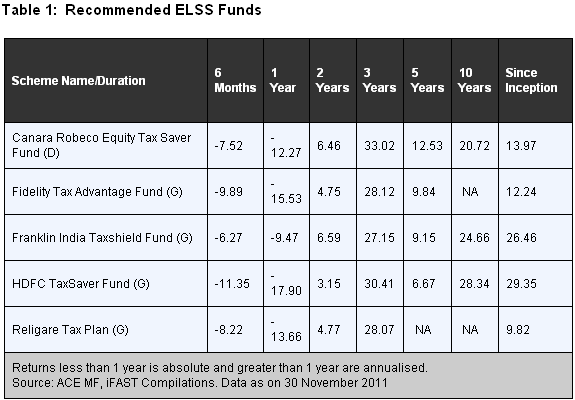
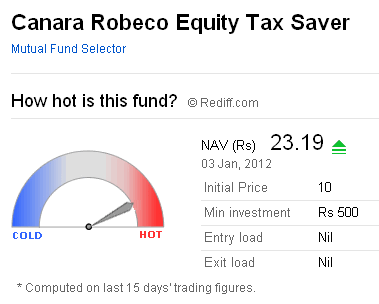
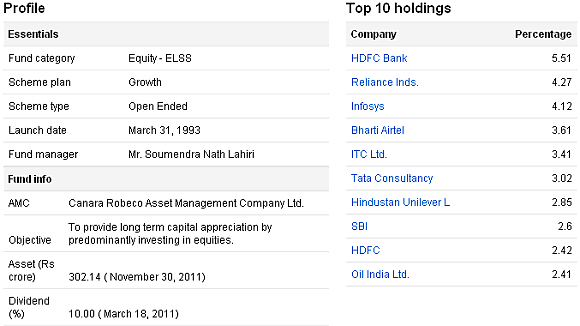
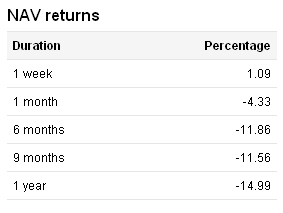
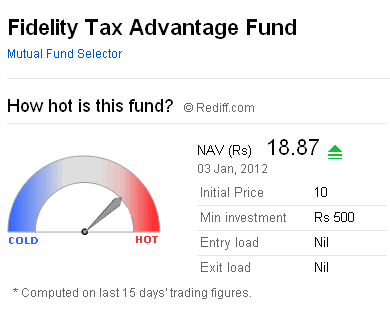
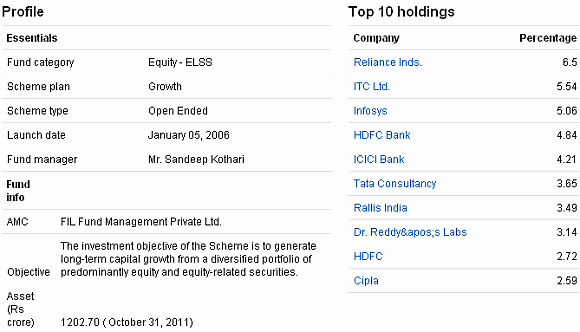
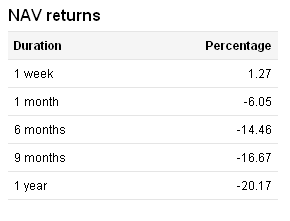
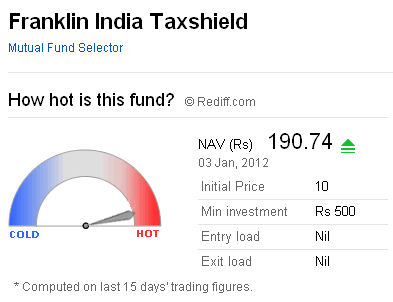
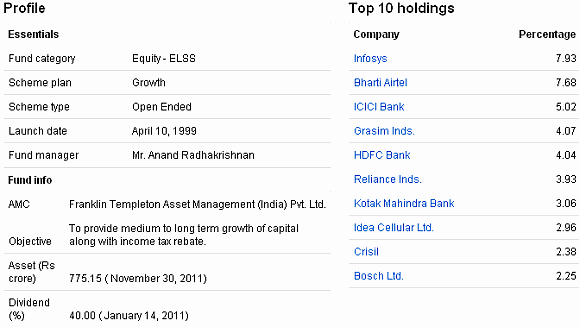
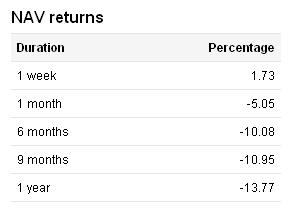
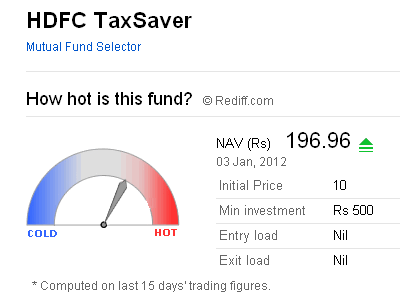


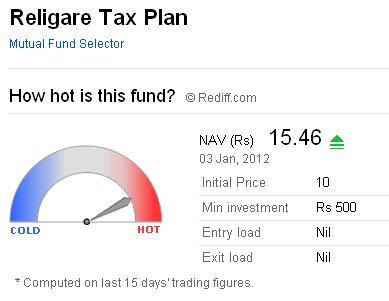

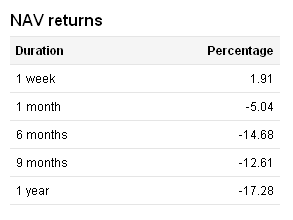
No comments:
Post a Comment